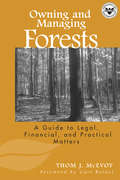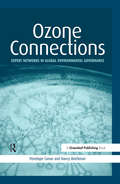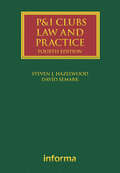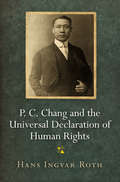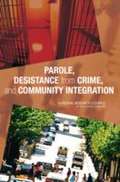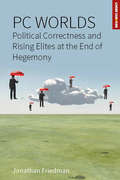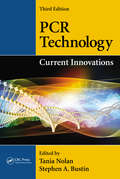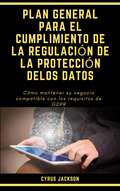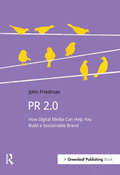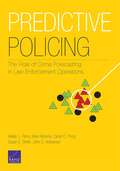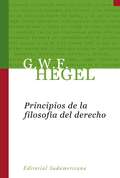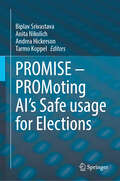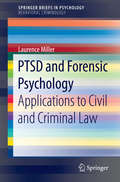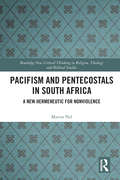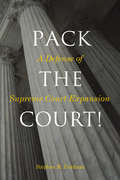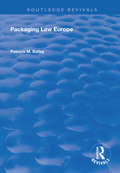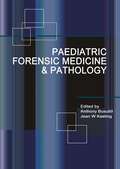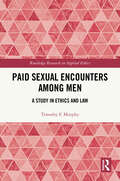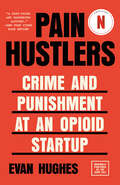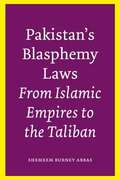- Table View
- List View
Owning and Managing Forests: A Guide to Legal, Financial, and Practical Matters
by Carl Reidel Thomas J. McevoyOwning and Managing Forests is both an accessible overview of the privileges, rights, and obligations that accompany forest ownership and a guidebook to help active forest owners and managers use laws to their advantage and avoid the pitfalls of expensive and exhausting litigation. The book is a revised, expanded, and updated edition of Legal Aspects of Owning and Managing Woodlands, published in 1998 by Island Press and named Best Forestry Book of the Year by the National Woodland Owners Association.This edition provides current information on recent changes in property, environmental, and tax laws, while also discussing new directions in forest management. It offers expanded treatment of topics including private property, searching property records, easements, estate planning, timber sale contracts, working with forestry professionals, and how to pass woodlands intact to future generations. The book also describes the many different facets of trusts, changes in forestland taxation methods, and new licensing and certification options. Included, too, is a section on avoiding disputes and how to use alternative dispute resolution methods to avoid costly, troubling, and time-consuming court battles.Owning and Managing Forests provides clear and concise descriptions of often confusing concepts and difficult subjects, and addresses issues in a competent yet conversational tone. Anyone involved with owning or managing forestland will find the book an essential guide and reference.
Ozarks Witness Protection (Arkansas Special Agents #3)
by Maggie WellsThe only thing between her and a murderer Is the special agent assigned to keep her safeTargeted by her husband&’s killer, injured and pregnant widow Kayla Powers needs a protection plan—pronto. But 24/7 bodyguard detail challenges Special Agent Ryan Hastings&’s security skills…and professional boundaries. The determined heiress will do anything to neutralize the threat to her unborn child, even offer herself as bait. But will her plan to step out of the shadows jeopardize Ryan&’s mission and his heart?From Harlequin Intrigue: Seek thrills. Solve crimes. Justice served.Discover more action-packed stories in the Arkansas Special Agents series. All books are stand-alone with uplifting endings but were published in the following order: Book 1: Ozarks Missing PersonBook 2: Ozarks Double HomicideBook 3: Ozarks Witness Protection
Ozone Connections: Expert Networks in Global Environmental Governance
by Penelope Canan Nancy ReichmanIt is difficult to think of a more significant example of international cooperation to address a problem that threatened the health and wellbeing of the entire planet than the 1987 Montreal Protocol for the Elimination of Ozone-Depleting Substances. This breakthrough in international environmental governance has proved to be an extraordinary success beyond rhetoric or promises. In a dozen years, this international agreement went from an understanding of the need to act in a precautionary manner for mutual benefit to a successful worldwide effort to eliminate chemical substances harmful to our protective ozone layer. The production and consumption of most ozone-depleting substances has now been phased out in developed countries, with developing countries not far behind. What happened and why is of tremendous importance for those looking for guidance in the future, particularly those now involved in hugely complicated negotiations on climate change. The success of the Montreal Protocol has been linked to many factors such as political will, treaty flexibility and the recognition of equity issues raised by developing countries. While comprehensively analysing all of these success factors, Ozone Connections goes on to suggest that a social organization of global governance as typified by the protocol's Technical and Economic Assessment Panel (TEAP) was a unique – but replicable – decisive factor. The book argues that we need to understand how the implementation of complex global environmental agreements depends on the construction and exploitation of social connections among experts who act collectively to define solutions to environmental problems. This highly original and provoking thesis synthesises some of the more exciting social science concepts and methods, while refining our basic understanding of environmental social change and providing policy-makers with concrete success factors to replicate. This book will be essential reading for academics in the fields of sociology, political science, international relations, network studies, human communication, motivation, collaboration and leadership, as well as the burgeoning interdisciplinary field of environmental studies. Businesses will also find many applications for practical use. Finally, the many directly transferable lessons from ozone layer protection make this book a key addition to the growing literature on climate change.
P&I Clubs: The Law And Practice (Lloyd's Shipping Law Library)
by David SemarkThis fourth edition is a detailed but easy-to-follow account of the constitution, workings and daily practice of protection and indemnity clubs. Designed to be a practical reference source for anyone who is in any way involved with mutual insurance, it offers comprehensive guidance on the complex area of P&I Clubs. The new fourth edition has been fully revised and updated since the last edition was written in 1999. New areas emphasised in the fourth edition include: • Piracy • Charterers’ liability insurance • Defence Cover • Disputes concerning the Inter-Club Agreement • Enforceability of arbitration agreements in the Club’s Rules. • The Club’s obligation to (i) make direct payments under certificates, (ii) pay death/ personal injury claims in the event of a member’s insolvency, and (iii) make indivisible personal injury claims.
P. C. Chang and the Universal Declaration of Human Rights (Pennsylvania Studies in Human Rights)
by Hans RothThe Universal Declaration of Human Rights is one of the world's best-known and most translated documents. When it was presented to the United Nations General Assembly in December in 1948, Eleanor Roosevelt, chair of the writing group, called it a new "Magna Carta for all mankind." The passage of time has shown Roosevelt to have been largely correct in her prediction as to the declaration's importance. No other document in the world today can claim a comparable standing in the international community. <P><P>Roosevelt and French legal expert René Cassin have often been represented as the principal authors of the declaration. But in fact, it resulted from a collaborative effort involving a number of individuals in different capacities. One of the declaration's most important authors was the vice chairman of the Human Rights Commission, Peng Chun Chang (1892-1957), a Chinese diplomat and philosopher whose contribution has been the focus of growing attention in recent years. Indeed, it is Chang who deserves the credit for the universality and religious ecumenism that are now regarded as the declaration's defining features. <P><P>Despite this, Chang's extraordinary contribution has been overlooked by historians.Peng Chun Chang was a modern-day Renaissance man—teacher, scholar, university chancellor, playwright, diplomat, and politician. A true cosmopolitan, he was deeply involved in the cultural exchange between East and West, and the dramatic events of his life left a profound mark on his intellectual and political work. <P><P>P. C. Chang and the Universal Declaration of Human Rights is the first biography of this extraordinary actor on the world stage, who belonged to the same generation as Mao Zedong and Chiang Kai-shek. Drawing on previously unknown sources, it casts new light on Chang's multifaceted life and involvement with one of modern history's most important documents.
PAROLE, DESISTANCE from CRIME, and COMMUNITY INTEGRATION
by National Research Council of the National AcademiesThe National Academies Press (NAP)--publisher for the National Academies--publishes more than 200 books a year offering the most authoritative views, definitive information, and groundbreaking recommendations on a wide range of topics in science, engineering, and health. Our books are unique in that they are authored by the nation's leading experts in every scientific field.
PC Worlds: Political Correctness and Rising Elites at the End of Hegemony (Loose Can(n)ons #2)
by Jonathan FriedmanThis provocative work offers an anthropological analysis of the phenomenon of political correctness, both as a general phenomenon of communication, in which associations in space and time take precedence over the content of what is communicated, and at specific critical historical conjunctures at which new elites attempt to redefine social reality. Focusing on the crises over the last thirty years of immigration and multiculturalist politics in Sweden, the book examines cases, some in which the author was himself involved, but also comparative material from other countries.
PC Worlds: Political Correctness and Rising Elites at the End of Hegemony (Loose Can(n)ons)
by Jonathan FriedmanThis provocative work offers an anthropological analysis of the phenomenon of political correctness, both as a general phenomenon of communication, in which associations in space and time take precedence over the content of what is communicated, and at specific critical historical conjunctures at which new elites attempt to redefine social reality. Focusing on the crises over the last thirty years of immigration and multiculturalist politics in Sweden, the book examines cases, some in which the author was himself involved, but also comparative material from other countries.
PCR Technology: Current Innovations, Third Edition
by Stephen A. Bustin Tania NolanPCR's simplicity as a molecular technique is, in some ways, responsible for the huge amount of innovation that surrounds it, as researchers continually think of new ways to tweak, adapt, and re-formulate concepts and applications. PCR Technology: Current Innovations, Third Edition is a collection of novel methods, insights, and points of view that
PLAN GENERAL PARA EL CUMPLIMIENTO DE LA REGULACIÓN DE LA PROTECCIÓN DELOS DATOS: Cómo mantener su negocio compatible con los requisitos de GDPR
by Cyrus JacksonEste libro nos introduce hacia algo relativamente nuevo dentro de las regulaciones legales internacionales. La reglamentación que deben llevar a cabo todas aquellas empresas, ya chicas, ya grandes en relación al manejo y protección de los datos personales de las personas, ya que a partir de la vigencia de esta nueva ley, practicamente todas las empresas del mundo estarán sujetas a ella. El leer este libro no enseña los puntos básicos para comprender los alcances de esta ley.
PR 2.0: How Digital Media Can Help You Build a Sustainable Brand (Doshorts Ser.)
by John FriedmanDigital media offer many of the same characteristics – immediacy, transparency and interactivity – that make one-to-one the most effective form of communication. And yet many organizations do not fully embrace them. They simultaneously underestimate and fear the power of digital communications. And yet these tools, when used strategically, can be an effective part of your communications plan.PR 2.0 will help you: 1. understand how the increasing emphasis on transparency driven by corporate responsibility has changed the ways that effective organizations communicate with their stakeholders; 2. develop a communications plan for your organization that reaches, and engages, the right stakeholders, using the most appropriate tools and channels; 3. demonstrate the value and “sell” the use of digital media to skeptical internal stakeholders, including in the c-suite, as part of your mission-advancing communications plan. You can make the most of the irrevocable changes in the way people create, share, receive, judge and interact with information. This book offers real-world examples and practical tools to help your organization to live its values and effectively engage with those most essential to your success.
PREDICTIVE POLICING: The Role of Crime Forecasting in Law Enforcement Operations
by Walter L. Perry Brian Mcinnis Carter C. Price Susan C. Smith John S. HollywoodPredictive policing is the use of analytical techniques to identify targets for police intervention with the goal of preventing crime, solving past crimes, or identifying potential offenders and victims. These tools are not a substitute for integrated approaches to policing, nor are they a crystal ball. This guide assesses some of the most promising technical tools and tactical approaches for acting on predictions in an effective way.
PRINCIPIOS DE LA FILOSOFIA DEL...(EBOOK)
by G. Wilhelm HegelEsta es la primera versión en español de la última obra editada por Hegel. La filosofía del derecho muestra los conceptos fundamentales de la filosofía y señala su lugar de encuentro definitivo con la teoría social. La filosofía del derecho presenta la estructura conceptual de la sociedad burguesa y da, al mismo tiempo, el viraje metódico que permite su superación. A partir de esta obra y en discusión con ella surge la revisión de toda la tradición filosófica y política, llevada a cabo entre otros por Marx y por la crítica social contemporánea.
PRIVATE LIVES
by Karen YoungElizabeth Walker has spent most of the past three decades trying to forget the loss of her mother and father, a lonely childhood spent in a series of foster homes and the two baby sisters she hasn't seen in twenty-five years. She values her privacy above everything, and has built a wall around herself that few people have ever climbed.But when her best friend, Gina, risks losing her young daughter to an impersonal court system-the same system that failed Elizabeth many years ago-she vows to fight back. But Elizabeth needs help. She needs the kind of help that a family can give, and she needs Ryan Paxton, the brilliant attorney whose tragic family history is intertwined with her own.As the custody battle turns to something more dangerous-and more deadly-Elizabeth comes face-to-face with a past she has tried to forget and a future she wants to embrace.
PROMISE – PROMoting AI’s Safe usage for Elections
by Biplav Srivastava Anita Nikolich Andrea Hickerson Tarmo KoppelThis book explores the evolving role of artificial intelligence in electoral processes, focusing on its potential to improve data-driven decision-making amid the growing challenges of misinformation, manipulation, and voter suppression. It discusses how AI tools—from chatbots to comprehensive data systems—could address information gaps for voters, candidates, and election commissions, especially during a pivotal election year like 2024, while acknowledging the skepticism and fears that often surround the use of AI in such critical civic functions. Drawing on insights from three specialized workshops at major AI conferences, the book compiles research and expert discussions from fields such as security, journalism, law, and political science. It serves as a comprehensive resource for researchers, educators, practitioners, students, and government officials, offering self-contained chapters that cover both technical and ethical aspects of employing AI in elections. The work also emphasizes the importance of maintaining high professional and ethical standards in the intersection of technology and democracy. This book will serve as an important resource on election topics, AI techniques and trust methods for researchers, teachers, practitioners, students and government officials in their efforts to improve democratic electoral processes with technology. It assumes the reader is knowledgeable, at high school level or higher, about one or more topics in civics and computing concepts. Sufficient background are given by contributors to make the chapters self-contained and widely understandable.
PTSD and Forensic Psychology
by Laurence MillerIn World War I, they spoke of shell shock. By World War II, the term was battle fatigue. Modern understanding of trauma psychology has evolved to give the concept a non-military name: posttraumatic stress disorder. As such, it has been at the heart of civil and criminal cases from workers' compensation to murder. PTSD and Forensic Psychology brings its topic into real-world focus by examining posttraumatic stress as a clinical entity and taking readers through the evaluation process for court cases involving the PTSD syndrome. This timely reference differentiates between PTSD and disorders that may be mistaken for it, and demonstrates its legal application in seeking civil damages and mounting a criminal defense. An evidence-based framework for conducting a trial-worthy evaluation and guidelines for establishing strong cases and refuting dubious ones further illustrate the protocols and challenges surrounding the status of PTSD in legal settings. For maximum usefulness, the book offers courtroom advice for expert witnesses as well as "practice points" at the end of each chapter. Featured topics include: History of the PTSD concept and its relation to the law. PTSD as syndrome: symptoms, diagnosis, treatment. PTSD and other traumatic disability syndromes. PTSD in the civil litigation and criminal justice systems. PTSD as an insanity defense and in claims of diminished capacity. PTSD cases: evaluation, interpretation, testimony. This thorough yet concise analysis makes PTSD and Forensic Psychology the ideal training tool for beginning mental health expert witnesses, as well as a concise practical review and reference source for seasoned forensic psychologists. It will also serve as a useful practice and teaching guide for attorneys, medical rehabilitation professionals, military personnel, psychotherapists, researchers, and educators in the fields of clinical and forensic psychology, criminology, traumatic stress studies, and mental health law.
Pacifism and Pentecostals in South Africa: A new hermeneutic for nonviolence (Routledge New Critical Thinking in Religion, Theology and Biblical Studies)
by Marius NelMost of the early twentieth-century Pentecostal denominations were peace churches that encouraged a stance of conscientious objection. However, since the Second World War Pentecostals have largely abandoned their pacifist viewpoint as they have taken on a more literal Biblical hermeneutic from their interaction with Evangelical denominations. This book traces the history of nonviolence in Pentecostalism and suggests that a new hermeneutic of the Bible is needed by today’s Pentecostals in order for them to rediscover their pacifist roots and effect positive social change. The book focuses on how Pentecostalism has manifested in South Africa during the twentieth century. Much of the available academic literature on hermeneutics and exegesis in the field of Pentecostal Studies is of an American or British-European origin. This book redresses this imbalance by exploring how the Bible has been used amongst African Pentecostals to teach on the apparent paradox of a simultaneously wrathful and loving God. It then goes onto suggest that how the Bible is read directly affects how Pentecostals view their role as potential reformers of society. So, it must be engaged seriously and thoughtfully. By bringing Pentecostalism’s function in South African society to the fore, this book adds a fresh perspective on the issue of pacifism in world Christianity. As such it will be of great use to scholars of Pentecostal Studies, Theology, and Religion and Violence as well as those working in African Studies.
Pack the Court!: A Defense of Supreme Court Expansion
by Stephen M. FeldmanThe United States Supreme Court has numbered nine justices for the past 150 years. But that number is not fixed. With the Democrats controlling the House and Senate during the Biden presidency, they could add justices to the Supreme Court. But would court packing destroy the Court as an apolitical judicial institution? This is the crucial question Stephen Feldman addresses in his provocative book, Pack the Court! He uses a historical, analytical, and political argument to justify court-packing in general and Democratic court-packing more specifically. Republicans and Democrats alike profess to worry that court-packing will destroy the legitimacy of the Supreme Court as a judicial institution by injecting politics into a purely legal adjudicative process. But as Feldman’s insightful book shows, law and politics are forever connected in judicial interpretation and decision making. Pack the Court! insists that court packing is not the threat to the Supreme Court’s institutional legitimacy that many fear. Given this, Feldman argues that Democrats should pack the Court while they have the opportunity. Doing so might even strengthen the American people’s faith in the Court.
Packaging Law Europe (Routledge Revivals Ser.)
by Bailey Patricia M.First published in 1999, this volume responds to the 1991 enactment by the German government of its Packaging Ordinance, which led to new or revised packaging legislation throughout the European Union. Problems caused by this divergent legislation led to the enactment of the Directive on Packaging and Packaging Waste in late 1994. Unfortunately, the imprecision of the Directive necessary to ensure its enactment has led to further disputes. At the heart of these disputes is the classic struggle between the priorities of environmental protection and economic development. This book analyses the implementation of the Directive by Member States, and in particular, issues such as the imposition of quotas on reusable containers; the use of economic instruments and environmental agreements; and competition issues and state aids. The book enlightens readers to the current debates regarding packaging legislation which continue today, despite the enactment of EU legislation.
Paediatric Forensic Medicine and Pathology
by Anthony Busuttil Jean KeelingChild abuse and suspicious child deaths are very complicated matters for clinicians, pathologists, law enforcement officials and legal professionals to investigate. Meanwhile, the evidence base for forensic pathology, especially in paediatrics, is steadily growing.
Pahan Banaalius: Kuvan vasta Jumalan Nazi-Logiikassa
by Ana Rubio-SerranoTämän kirjan tarkoituksena ei ole näyttää vain historiallinen Auschwitz, mutta Auschwitz, joka on juurtunut ihmisen ei-kyky erottaa hyvä ja paha; pakkomielle vahvistaa henkilön identiteettiä kuin vain ihmisen ja mahdottomuus ajatella, toiseuden, siten, että, vaikka tänään, tätä jatkuu, kuten perinnön, josta meidän maailmamme on sekä toimeenpanijana ja perillinen. Auschwitz on siis lähtökohta, mutta ei päätepiste. Kyseessä on tutkimus, jossa Natsiantropologiasta syntynyt anti-ihmismalli esitetään vastoin kristillisen antropologian paljastamaa ihmismallia. Hänen väitöskirjansa osittainen julkaisu.
Paid Sexual Encounters among Men: A Study in Ethics and Law (Routledge Research in Applied Ethics)
by Timothy F. MurphyThis book analyzes the ethics of men buying and selling sex to one another. It gathers in one place key ethical and legal issues that bear on the justification for the criminalization of male prostitution.At present, prostitution – the solicitation or offer of paid sexual encounters – is criminalized in virtually the entire United States. Male prostitution is poorly studied across academic disciplines, and this book represents the first sustained ethical analysis of the topic. First, it shows that paid sexual encounters among men belong on a spectrum of transactional sexual relationships and that many of their features are not distinctive in a way that justifies condemnation. It shows as well that the sexuality involved – men having sex with men – does not involve relationships that are immoral in a way that might justify criminalization. The book also demonstrates that men buying and selling sexual encounters can consent in morally meaningful ways, without reinforcing status inequality, Finally, the book reviews key constitutional law cases to show that a certain interpretation of the relationship between the law and morality justifies decriminalization of male prostitution.Paid Sexual Encounters among Men will appeal to scholars and graduate students working in applied ethics, the philosophy of sex and gender, sociology, and law.
Pain Hustlers: Crime and Punishment at an Opioid Startup Originally published as The Hard Sell
by Evan HughesThe inside story of a band of entrepreneurial upstarts who made millions selling painkillers—until their scheme unraveled, putting them at the center of a landmark criminal trial. • SOON TO BE THE MAJOR MOTION PICTURE PAIN HUSTLERS STARRING EMILY BLUNT AND CHRIS EVANS "Unfolds with the velocity and verve of a Scorsese film…A tour de force."—Patrick Radden Keefe, New York Times bestselling author of Empire of Pain and Say Nothing John Kapoor had already amassed a small fortune in pharmaceuticals when he founded Insys Therapeutics. It was the early 2000s, a boom time for painkillers, and he developed a novel formulation of fentanyl, the most potent opioid on the market. Kapoor, a brilliant immigrant scientist with relentless business instincts, was eager to make the most of his innovation. He gathered around him an ambitious group of young lieutenants. His head of sales—an unstable and unmanageable leader, but a genius of persuasion—built a team willing to pull every lever to close a sale, going so far as to recruit an exotic dancer ready to scrape her way up. They zeroed in on the eccentric and suspect doctors receptive to their methods. Employees at headquarters did their part by deceiving insurance companies. The drug was a niche product, approved only for cancer patients in dire condition, but the company&’s leadership pushed it more widely, and together they turned Insys into a Wall Street sensation. But several insiders reached their breaking point and blew the whistle. They sparked a sprawling investigation that would lead to a dramatic courtroom battle, breaking new ground in the government&’s fight to hold the drug industry accountable in the spread of addictive opioids. In Pain Hustlers, National Magazine Award–finalist Evan Hughes lays bare the pharma playbook. He draws on unprecedented access to insiders of the Insys saga, from top executives to foot soldiers, from the patients and staff of far-flung clinics to the Boston investigators who treated the case as a drug-trafficking conspiracy, flipping cooperators and closing in on the key players. With colorful characters and true suspense, Pain Hustlers offers a bracing look not just at Insys, but at how opioids are sold at the point they first enter the national bloodstream—in the doctor&’s office.
Painless Police Report Writing: An English Guide for Criminal Justice Professionals, Third Edition
by Barbara Frazee Joseph N. DavisWith an emphasis on relevance, this book tailors English instruction to the needs of police training and law enforcement. Taking a building block approach, the first five chapters present English grammar and the last two chapters are devoted to the police report writing process. Each chapter includes practice and review exercises that are taken from the field and assignment material that is geared to law enforcement interests. This edition features sample reports, sample forms and “war stories” that help students see how grammar and writing skills are used in their profession.
Pakistan's Blasphemy Laws: From Islamic Empires to the Taliban
by Shemeem Burney AbbasUnder the guise of Islamic law, the prophet Muhammad's Islam, and the Qur'an, states such as Pakistan, Afghanistan, Egypt, Saudi Arabia, and Bangladesh are using blasphemy laws to suppress freedom of speech. Yet the Prophet never tried or executed anyone for blasphemy, nor does the Qur'an authorize the practice. Asserting that blasphemy laws are neither Islamic nor Qur'anic, Shemeem Burney Abbas traces the evolution of these laws from the Islamic empires that followed the death of the Prophet Muhammad to the present-day Taliban. Her pathfinding study on the shari'a and gender demonstrates that Pakistan's blasphemy laws are the inventions of a military state that manipulates discourse in the name of Islam to exclude minorities, women, free thinkers, and even children from the rights of citizenship. Abbas herself was persecuted under Pakistan's blasphemy laws, so she writes from both personal experience and years of scholarly study. Her analysis exposes the questionable motives behind Pakistan's blasphemy laws, which were resurrected during General Zia-ul-Haq's regime of 1977-1988--motives that encompassed gaining geopolitical control of the region, including Afghanistan, in order to weaken the Soviet Union. Abbas argues that these laws created a state-sponsored "infidel" ideology that now affects global security as militant groups such as the Taliban justify violence against all "infidels" who do not subscribe to their interpretation of Islam. She builds a strong case for the suspension of Pakistan's blasphemy laws and for a return to the Prophet's peaceful vision of social justice.
